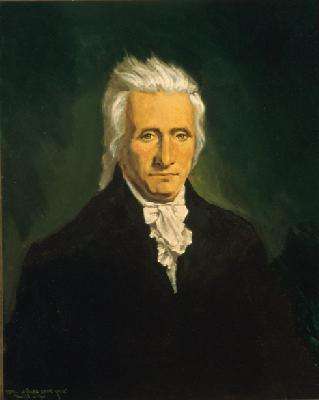The Volokh Conspiracy
Mostly law professors | Sometimes contrarian | Often libertarian | Always independent
Today in Supreme Court History: November 18, 1811
11/18/1811: Justice Gabriel Duvall takes judicial oath. Professor David P. Currie said that an "impartial examination of Duvall's performance reveals to even the uninitiated observer that he achieved an enviable standard of insignificance against which all other justices must be measured."

Editor's Note: We invite comments and request that they be civil and on-topic. We do not moderate or assume any responsibility for comments, which are owned by the readers who post them. Comments do not represent the views of Reason.com or Reason Foundation. We reserve the right to delete any comment for any reason at any time. Comments may only be edited within 5 minutes of posting. Report abuses.
Please to post comments


Well, someone has to be last!
Like the old joke, "what do you call the guy who graduated last in his class in med school?"
Queen v. Hepburn
Ouch, that's just downright vicious.
To be fair, that degree of obscurity requires never seriously screwing up, which is itself a form of excellence.
"The one time when Duvall dissented was in the case of Mima Queen and Child vs. Hepburn (1813) where he was the sole dissenting justice in a case that ruled whether the daughter of an ex-slave could provide hearsay evidence that her mother was free at the time of her birth. Duvall wrote that the evidence should be allowed, and "people of color from their helpless condition under the uncontrolled authority of a master, are entitled to all reasonable protection.""
Doesn't sound to me like he was a bad justice at all, which is maybe why he is hardly remembered.
I don't get many chances to agree with Brett, but -- hear, hear.
Take slavery out of the case and it becomes an interesting question on rules of evidence. I can testify about my parents' birthdays even if I wasn't there when they were born, but I can't testify about most things that happened in that decade because I wasn't there.
Rule 804: Hearsay Exceptions.
"(b) The Exceptions. The following are not excluded by the rule against hearsay if the declarant is unavailable as a witness:
...
(4) Statement of Personal or Family History. A statement about:
(A) the declarant’s own birth, adoption, legitimacy, ancestry, marriage, divorce, relationship by blood, adoption, or marriage, or similar facts of personal or family history, even though the declarant had no way of acquiring personal knowledge about that fact; or
(B) another person concerning any of these facts, as well as death, if the declarant was related to the person by blood, adoption, or marriage or was so intimately associated with the person’s family that the declarant’s information is likely to be accurate."
Moe: How about you? Where were you born?
Curly: In a hospital.
Moe: Which hospital?
Curly: I don't know. I was very young then.
It sounds to me like he was in fact one of the great justices. Judges should not be remembered has having been a great influence but should be as much like a referee in a game, the less heard from the better.
The "inconsequential" remark probably had to do with Constitutional issues, where indeed Duvall left no mark. But in those days the Court rarely touched on those. Most of its business, in those pre-Erie and even pre-Swift v. Tyson days, was in disputes between private parties in non-federal areas, such as questions of land title and contract (such as the Queen case). Maybe Duvall was important in those. He did write a number of majority opinions. And maybe he was influential in conference. We probably can't really know.